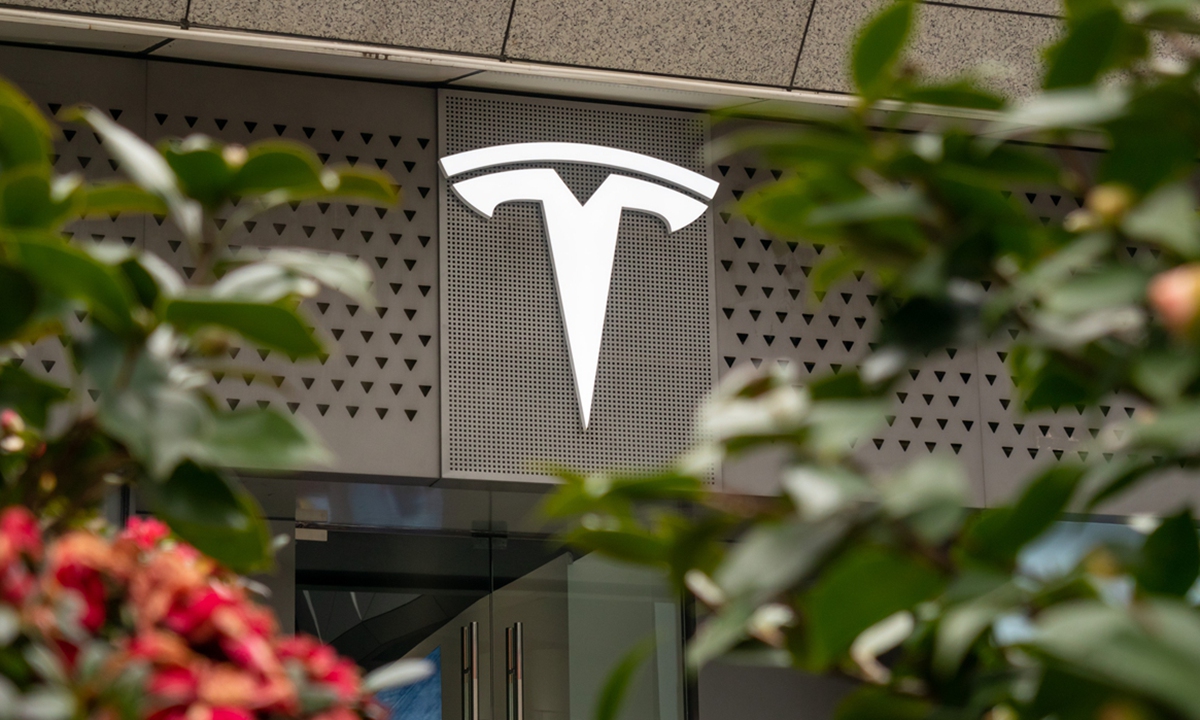
Tesla experience center in Shanghai, China Photo: VCG
Amid global economic uncertainties, Tesla has achieved a new sales record in China. At the start of the new year, Tesla released its 2024 sales "report card," which shows that, for the first time since 2011, the company saw a year-on-year decline in its global vehicle sales. However, Tesla's sales in the Chinese mainland witnessed a "counter-trend growth," rising 8.8 percent to a record high of more than 657,000 cars in 2024, representing 36.7 percent of its global total. It is not hard to see that the impressive performance in the Chinese market has become the "biggest contributor" to Tesla's overall achievement of the year, and this "report card" reveals an enlightening fact.
Some argue that in order to turn Elon Musk's pie-in-the-sky sort of visionary ideas into reality, China's supply chain is essential. For Tesla, China is not only a key market but also a production base and regional sales hub. The country's strong infrastructure, labor advantages, and mature, complete supply chain are indispensable pillars of Tesla's successful "Chinese story."
Since it began production in 2019, Tesla's Shanghai factory has leveraged China's robust supply chain and top-tier manufacturing capabilities to achieve the impressive feat of rolling off a complete vehicle in over 30 seconds. In 2024, China's annual production of new energy vehicles (NEVs) surpassed 10 million units for the first time, with Tesla's Shanghai factory making a significant contribution to this green milestone. Recently, the second Tesla Shanghai megafactory - the energy storage megafactory, has been completed and started trial production. This represents another vivid example of how China and the US can meet each other halfway, engage in cooperation and foster win-win collaboration.
It is also worth noting that while Tesla was celebrating its impressive sales in China, its Chinese competitors - BYD, NIO, XPeng, and others - also achieved remarkable sales performance both domestically and internationally. This demonstrates that the "cake" of the NEV market is large, and the opportunities and benefits of the green industry era are available for both Chinese and foreign automakers to jointly develop and share. The popularity of Tesla's differentiated products in China clearly shows that even in the highly competitive Chinese NEV market, foreign automakers can still find a unique place for themselves.
Currently, the NEV industry and the green sector in the Chinese market have formed a virtuous cycle. Due to sufficient and open market competition, companies have an endless drive to improve and optimize their technologies and services to adapt to competition. The continuous introduction of innovative products encourages consumers to change their consumption habits and expand green consumption. In turn, the ever-expanding market continuously motivates related enterprises. According to industry data cited by UK media recently, in the first 11 months of last year, over 90 percent of an increase in global EV and hybrid sales over last year came from China. China is not only leading the world in the production of new energy vehicles but also in their consumption.
China has become an important part of Tesla's global landscape, and this is not an isolated case. Currently, over 70,000 American companies are investing and operating in China, with annual sales exceeding $600 billion. Qualcomm and Intel derive two-thirds and one-quarter of their global revenues, respectively, from the Chinese market. Among Apple's 200 major suppliers, 80 percent are based in China. In 2023, about 60 percent of McDonald's new stores globally were opened in China. Shanghai became the first city in the world to have 1,000 Starbucks stores. These facts demonstrate that Washington's trade sanctions and technological restrictions against China are unpopular and cannot hinder American companies' enthusiasm for expanding in the Chinese market. This situation is determined by the essence of mutually beneficial cooperation in economic and trade relations between China and US, as well as the objective laws of economic development at play.
Tesla's "report card" serves as a mirror, reflecting China's status as "an important engine of global economic growth" from both production and market perspectives, while showcasing the solid fundamentals and positive development prospects of the Chinese economy. Tesla's thriving presence in China can particularly be attributed to the country's open, inclusive, and mutually beneficial cooperative attitude.
Behind this lies not only China's profound insight into the logic of historical development, but also a glimpse of the myriad opportunities that China offers to the world.

